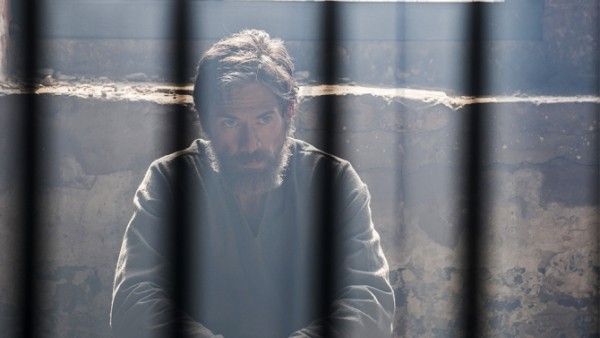The biggest criticism of Tyrant's first season was the casting of Adam Rayner, a quite white British actor, in the role of Bassam Al-Fayeed, the Americanized, self-banished scion of President Al-Fayeed (Nasser Faris), the ruler of the fictional Middle-Eastern nation of Abbudin. Not only did Rayner's ... let's call it "pretty" appearance highlight the show's more irksome and flat melodramatic passages, but next to the Galilee-born Ashraf Barhom, who plays Bassam's wildly sadistic, power-obsessed brother Jamal, blue-eyed Rayner seemed simply not to belong in the frame with actors who, for lack of a better phrase, look the part. There's a part of me, however, that has always suspected that this casting was less the work of opportunistic producers who were scared to put anyone but a white male in the lead, and more an expressionistic touch, a way of palpably underlining Bassam's inherent Western attitude and philosophies amidst a world bent on strict traditionalism, fascism, and unending military-enacted violence.
His Western thinking is both the reason he tried to assassinate Jamal throughout the second half of Season 1, and why Jamal caught him and -- as Season 2 opens -- sentences him to be executed. His hanging doesn't go exactly as planned, however, and Season 2 quickly becomes about the two men's divergent paths: Jamal's attempt to bring a false image of a peaceful Abbudin to the global stage via oil and a tentative partnership with China, while Bassam seeks to find his roots in the country and in Islam. Creator Gideon Raff, alongside Homeland development partner Howard Gordon and Dirty Sexy Money alumn Craig Wright, would seemingly be tracking two states of thinking that keep numerous Middle-Eastern countries in ceaseless conflict, that being the pull to be at once progressive and traditionalist as a leader of a non-democratic nation, the outcome of which is always bloody.
The series has always had a complex vision of privilege, which is one of its most prominently alluring elements, and in season two, the creators and writers push that concept even further. Not only does Jamal think his God-given (read: inherited through family) wealth and status at home means he deserves unquestioned support and strict adherence from his people, no matter his actions, but he thinks he deserves the respect of the world. With his brother's voice still in his head, he no longer seems to have any interest in mass slaughter but remains quite vague when he asks his simply heartless uncle, the head of the military, to quash any rebellion, which leads to another mass gassing via a rocket sent right into the heart of an Abbudin marketplace. The writers nicely parallel Jamal's attempts to be a liberator while remaining a savage ruler with the rise of his son, Ahmed (Cameron Gharaee), as the minister of energy, a role forced onto him when he had dreams of becoming a London-based hotelier. Like his father, Jamal intwines familial love and support with rigid obedience to his government, and Tyrant regularly confronts the astringent effects of such demands.
That being said, Season 2 doesn't quite attempt to humanize Jamal the way the character was in Season 1, where his faith in his "career" was consistently undermined and questioned. More dubious, however, is the show's glaringly safe depiction of religion as the one thing that keeps Abbudin's people together, never quite giving a conflicting view of religion -- Islam in this case -- as a recognized system meant to impress uniformity and unflinching loyalty to a supreme overseer to the populace. In other words, Bassam's journey is clearly presented as the right way to do things, whereas Jamal's is evidently wrong, which in essence adheres to a hugely arguable position that if everyone simply thought and felt like Bassam, Abbudin would be a desert-set Utopia. There's a lack of specificity to all of the doings that makes Tyrant intermittently seem flippant in its dramatic depictions, and makes its more melodramatic flourishes borderline unendurable.
Still, the first three episodes of the season tease some interesting dramatic developments to come, from Leila's (Moran Atias) increasingly precarious position as the "mother" of Jamal's country and Bassam's son, Sammy (Noah Silver), inheriting a fortune from his family, the entirety of which is left to him, not his mother, Molly (Jennifer Finnigan) or sister, Emma (Anne Winters). The show also has a far more challenging view of rebellion than season one, with the increasing death toll of citizens and rebels becoming too much for even the inspirational Ihab Rashid (Alexander Karim) to excuse as the tough price of revolution. Just like season one, however, Tyrant dangles precariously between careless and compelling, at once fearlessly tackling tough, not-exactly-mainstream subject matter and diluting it with needlessly diverting, deeply familiar melodramatic turns, rather than looking for the revealing, experiential details of the Al-Fayeeds' perilous existence. Tyrant has grown in ambition since season one, both politically and dramatically, but its narrative faults remain and are even more potent in the light of its escalated conflicts.
★★★ Good — Proceed with cautious optimism





